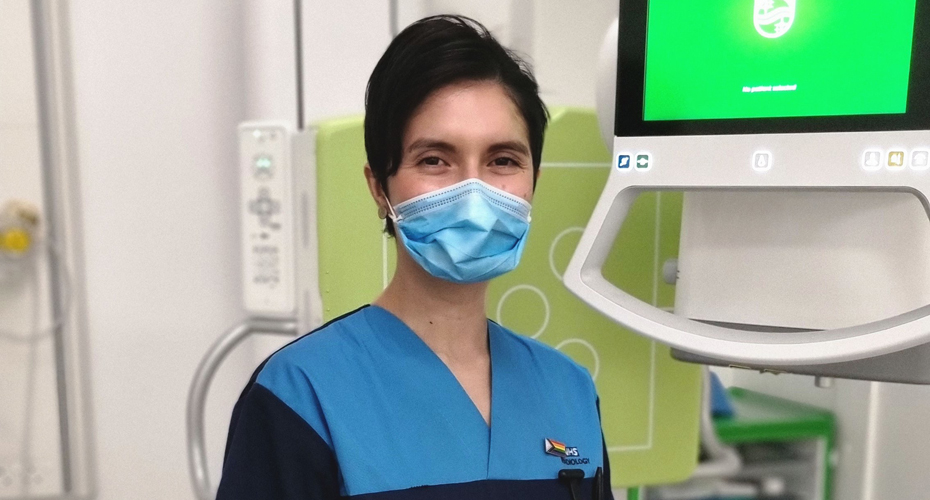Alejandra, Diagnostic Radiographer Apprentice

Alexjandra, Diagnostic Radiographer Apprentice
What was your background before starting this course?
Before the programme, I had been working as a Health Care Assistant for around two years. After I had decided that nursing wasn’t for me but wanted to stay in healthcare, my employer encouraged me to apply for the Diagnostic Radiographer Degree Apprenticeship programme.
I also joined the programme as a mature student, having studied my first degree in Fashion and Textile Design. My journey demonstrates how, even if you don’t have a background in sciences, you can still succeed. I could not have progressed any further in healthcare without doing this degree apprenticeship. It has opened so many doors for me!
How have you found the learning experience?
Studying a degree apprenticeship has really helped me change my career path into something more aligned with my values. Every day is different and brings an opportunity to learn something new.
The degree apprenticeship really suits my learning style as I’m very visual. The combination of three days clinical training and two days virtual study fits my personality a lot more. For me, the theory is more challenging but I’m really engaging with it and learning why we do things.
It’s also really helped that our peer support is so strong. Thanks to my peers, I have found new ways of learning that I hadn’t engaged with before. As the course is virtual, we’ve been able to support each other in new and exciting ways; in particular, the exchange of knowledge and information has been great.
How does the course benefit your current role and organisation?
The degree apprenticeship helps me bring new skills and perspectives to my Radiography Team. In conversations with my team, it’s really helpful to hear the stories of how the profession has changed over time and to exchange knowledge with radiographers across generations.
Often, apprentices have different backgrounds they can bring to their team. For example, I bring the bedside manner and nursing skills of a healthcare assistant, as well as the skills I’m learning through the degree apprenticeship. Within my cohort there are apprentices from all sorts of backgrounds, which gives us a diverse mix of skills and perspectives to take to our colleagues.
Having worked in the department before starting my degree apprenticeship, I’ve found that everyone is excited to mentor me and pass on their knowledge. There’s a positive dynamic in the team because, looking long term, it benefits my employer to know I’m more likely to stay in the role.
What are some of the things you've enjoyed most about the course?
I really enjoy our campus weeks, particularly interacting with my peers and lecturers. The seminars are great: our lecturers always encourage us to turn our cameras and mics on and get a conversation going. They try to make sessions more engaging with things like online quizzes while we’re doing the seminar, so even if you don’t want to speak up you can still engage.
The Programme Leads care so much about having the course succeed and helping to bring more people into the profession. It’s much wider than just helping you to get good grades; they are always thinking about the workforce and what the NHS needs from the degree. At the same time, Exeter keeps us informed about what our employers should be doing for us, which empowers us to tell them what we need.
I’ve also really liked how receptive the University of Exeter is to feedback, and how much they encourage us to give feedback to our Module Leads. We have a space on our virtual platform (ELE) that shows how they’ve implemented changes based on feedback across cohorts; it makes me feel really happy that my voice is heard.
Would you recomment studying a degree apprenticeship at Exeter?
I would definitely recommend doing a degree apprenticeship with the University of Exeter. For me, having the opportunity to go to a university that’s highly reputable and well connected within the industry is great.
For example, the links the University of Exeter has with the Society of Radiographers (SoR) is fantastic. They encourage us to get involved and I’m now a representative for the SoR. All this creates that culture of support outside your workplace and makes you feel like you are part of the wider radiography community.
Exeter also pushes you out of your comfort zone to succeed and try new things. A real personal highlight was my leadership placement with Health Education England (HEE), which was recommended to me directly by one of our course tutors. This placement helped me to develop leadership skills, which has opened even more doors and prepared me for going down the leadership route in future. I wouldn't have done this if Exeter didn’t actively encourage me and also have strong links with HEE.
We constantly get that support from our tutors to challenge ourselves and go for extra things outside of the degree apprenticeship. Since my placement with HEE, for example, my lecturers have encouraged me to apply to the #150 Leaders programme and connected me with students currently on the programme.



